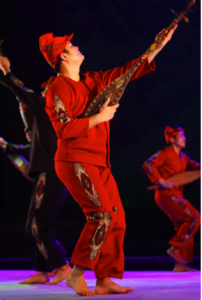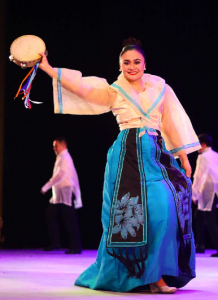PH folk dance at world-class level
PH folk dance at world-class level

Leo Lorilla from the Bayanhian Dance
Company. (Courtesy of Patrick Alcedo’s Facebook post)
Bayanihan Dance Co. at York University
By Patricia Gabrielle Dolor
The Philippine Reporter
Bayanihan, the national dance company of the Philippines is a multi-awarded company, both nationally and internationally and created a new pride in the cultural heritage of Filipinos around the globe. It sparked a new dimension to the country’s dance tradition, and made it timeless.
The Cardinal Points presented by the department of dance at York University juxtaposes the notions of identity and change. Susan Lee, artistic director, says “Through the works presented and the breadth of artists involved – both established and emerging, Canadian and international, Indigenous and settler – we reflect on how we orient ourselves internally, geographically, culturally and historically. In Cardinal Points, we look at the past with new eyes, so we can better understand the present, and move forward into a brighter future.”
The Bayanihan’s guest performance at Cardinal Points was held at The Sandra Faire and Ivan Fecan Theatre located in York Univeristy, and the special performances were held from February 15-17, 2023.
There was also a great opportunity to learn Philippine folk dance from Leo Lorilla and Pamela Corales, two of the core performing artists of the Bayanihan dance company, on February 13, 2023. This was held at Kalayaan Cultural Community Centre in Mississauga, Ontario.

Pamela Corales from the Bayanhian Dance Company. (Courtesy of Patrick Alcedo’s Facebook post)
When attending the Cardinal Points performance in their opening night, I was amazed by the students’ and guest dancers’ passion. I was thrilled to see a moving art form feel so tangible and emotional. It had a variety of different cultures and dances, such as the Bayanihan’s, and so much diversity was displayed. It was an amazing sight.
I got to speak to Dr. Patrick Alcedo, a dance researcher, a specialist on Philippine traditional dances, and the chair of and a Professor in the Department of Dance at York University.
The Philippine Reporter: For Cardinal Points, there were many diverse components to the various performances. How did the idea come about and how did it evolve?
Patrick Alcedo: The idea came about through our Department’s commitment to equity, diversity and inclusion. Through Cardinal Points, we wanted to show to the public that what we teach and value in our Department is reflected in the very dances that we put on stage.
TPR: Why did the faculty of dance choose Bayanihan (National Dance Company of the Philippines) to be the guest artists?
PA: The Philippine Studies Group at York University, of which I am member, received a grant from the Philippines’ Department of Foreign Affairs to bring scholars, activists, researchers and artists from the Philippines. As a scholar of Philippine folk dance and a performer of this art form, I immediately proposed to bring Pamela Corales and Leo Lorilla, Bayanihan’s core performing artists to York. Bayanihan is not only our country’s National Dance Company but is also a model of how to respectfully present Philippine folk dances on stage and for theatre.
TPR: How do you think they added to the program?
PA: They for sure enriched the program and further deepened our Department’s commitment to diversity and global engagement. As seasoned performers, Pamela and Leo helped model for our students what it means to perform Philippine folk dance at a world-class level.
TPR: Why do you think it’s essential to highlight Filipino culture in spaces/places like these?
PA: Putting spotlight on Filipino culture through our traditional dances and music is an event such “Cardinal Points” indicates that these forms also belong in a professional theatre and that they could be choreographed and re-staged to be performed side by side with contemporary dance pieces and other global dance forms. As Filipinos are one of the fastest growing immigrant populations in Canada, the presence of Philippine folk dance and music at an event such as this points to our being active shapers of Canada’s cultural identity or identities.
TPR: Lastly, how as dance as an expression, represent culture and reflect on issues (example: “Ancestor 73”)? What do you love most about dance? How has your own culture shaped your relationship with the art form?
PA: Dance has the power to be in dialogue with and to also critique world matters of great importance such as climate crisis and respect towards indigeneity, as demonstrated so well by Ancestor 73. This is what I love most about dance—it’s ability to both reflect on socio-cultural and political matters and affect, hopefully, positive change. I grew up dancing in Kalibo, Aklan, my hometown in the central Philippines, that values dance and dancing regardless of class, ethnicity, gender and sexual orientation. Thus, I have grown to value dance as a form that is for everyone and as a tool for inclusivity and intercultural understanding.
Comments (0)